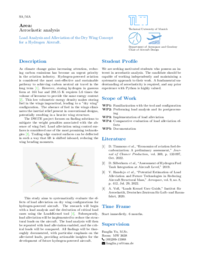Load Analysis and Alleviation of the Dry Wing Concept for a Hydrogen Aircraft
- Institut
- Lehrstuhl für Luftfahrtsysteme
- Typ
- Semesterarbeit Masterarbeit
- Inhalt
- theoretisch
- Beschreibung
As climate change gains increasing attention, reducing carbon emissions has become an urgent priority in the aviation industry. Hydrogen-powered aviation is considered the most cost-effective and sustainable pathway to achieving carbon neutral air travel in the long term [1]. However, storing hydrogen in gaseous form at 164 bar and 288.15 K requires 5.6 times the volume of kerosene to provide the same energy content [2]. This low volumetric energy density makes storing fuel in the wings impractical, leading to a ”dry wing” configuration. The absence of fuel in the wings eliminates the inertial relief present in conventional designs, potentially resulting in a heavier wing structure.
The DWiTE project focuses on finding solutions to mitigate the weight penalties associated with the absence of wing fuel. Load alleviation using control surfaces is considered one of the most promising technologies [3]. Trailing edge control surfaces can be deflected in such a way that lift is shifted inboard, reducing the wing bending moments.This study aims to systematically evaluate the effects of load alleviation on dry wing configurations for hydrogen-powered aircraft. The research will begin with a load analysis and the derivation of critical load cases using the LoadsKernel tool [4]. Subsequently, load alleviation will be implemented to reduce the structural loads on the aircraft. The load analysis will then be repeated with load alleviation enabled, and the critical loads will be compared. All findings will be thoroughly documented, with particular emphasis on the alleviated loads, providing actionable insights for the development of future hydrogen-powered aircraft.
- Voraussetzungen
We are seeking motivated students who possess an interest in aeroelastic analysis. The candidate should be capable of working independently and maintaining a systematic approach to their work. A fundamental understanding of aeroelasticity is required, and any prior experience with Python is highly valued.
- Möglicher Beginn
- sofort
- Kontakt
-
Fanglin Yu, M.Sc.
Raum: Raum 3633
Tel.: +49 (89) 289 - 15988
fanglin.yutum.de - Ausschreibung
-
